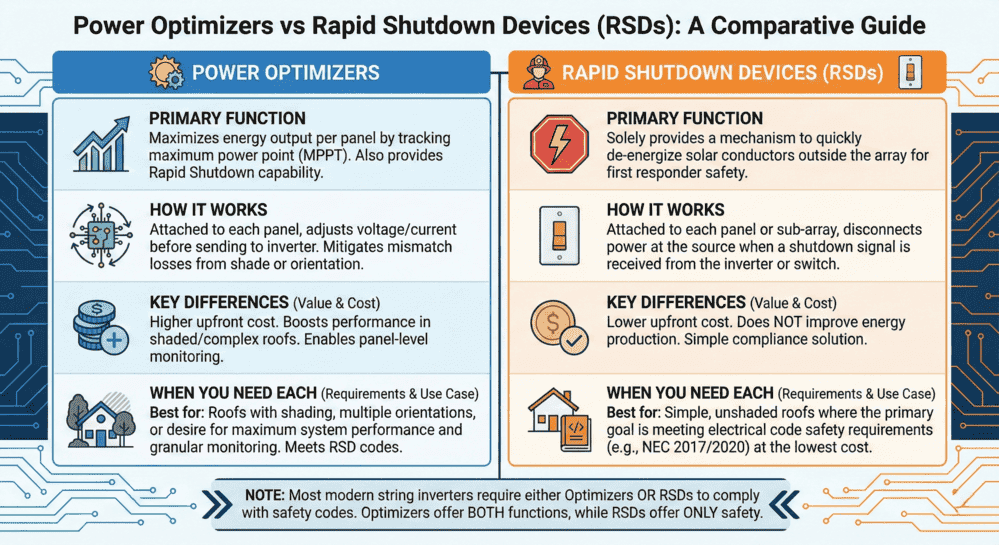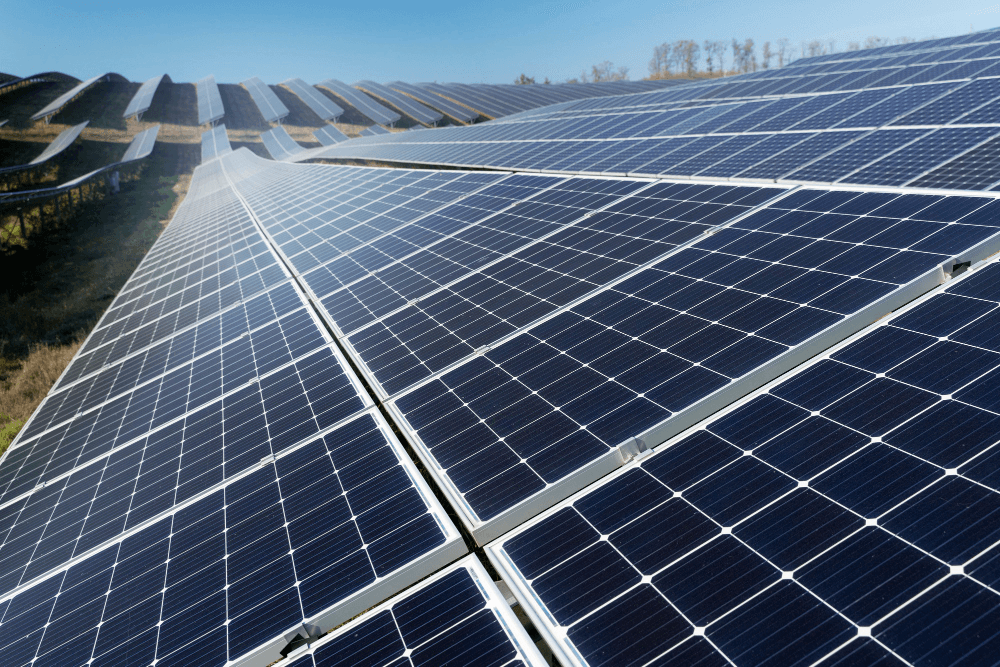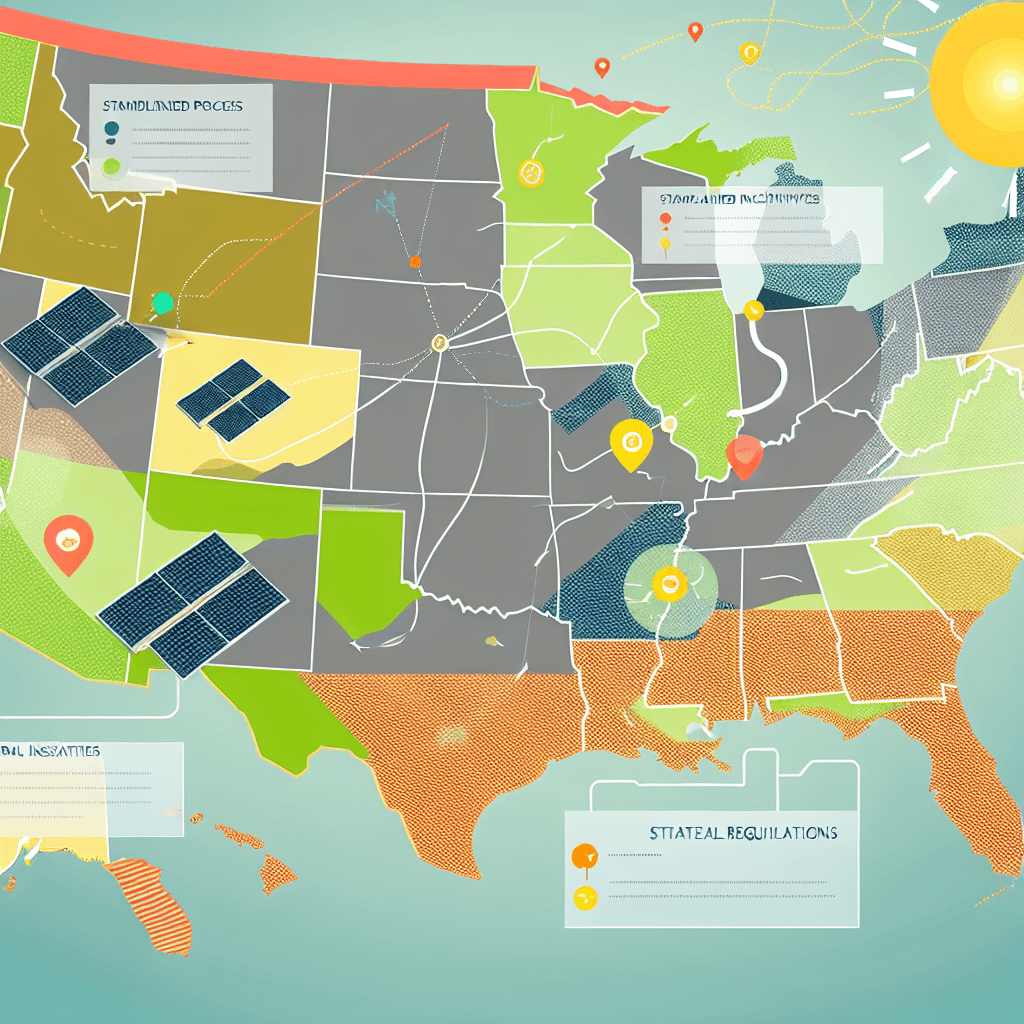Solar permits are required legal authorizations from local governments that verify solar panel installations comply with building codes, electrical standards, and zoning regulations before installation begins. Most jurisdictions require building permits, electrical permits, and structural permits, with costs ranging from $50 to $1,500 depending on location and system size. The permitting process typically takes 2-8 weeks and involves submitting documentation, including site plans, electrical diagrams, equipment specifications, and structural calculations, to your local building department. While federal guidelines establish frameworks, solar permit requirements are primarily governed by state and local authorities, with streamlined processes available in solar-friendly states like California, Arizona, and Massachusetts that feature expedited review timelines and standardized application forms.
Getting solar panels installed on your property is an exciting step toward sustainable living, but navigating the permitting process can be challenging. This comprehensive guide breaks down everything you need to know about solar permits across the United States, ensuring your renewable energy project starts on the right foot.

Understanding Solar Permits Basics
Solar permits are official authorizations required by local governments before installing solar panels on your property. These permits ensure that your installation meets safety standards, building codes, and local regulations. While federal guidelines provide a framework, most solar permits are governed by state and local jurisdictions.
Typically, you’ll need multiple permits for your solar installation:
- Building permits
- Electrical permits
- Zoning permits
- HOA approvals (where applicable)
Essential documentation usually includes:
- Detailed system designs
- Site plans
- Equipment specifications
- Structural engineering reports
Solar Permit Application Process
The application process follows these general steps:
- Site Assessment and System Design
- Document Preparation
- Application Submission
- Plan Review
- Permit Issuance
- Installation
- Final Inspection
To avoid common pitfalls, ensure:
- All drawings are to scale
- Electrical diagrams are complete
- Structural calculations are included
- Required signatures are obtained
Permit Costs and Timeline
Permit costs vary significantly by location:
- Small residential systems: $200-500
- Large residential systems: $500-1,000
- Commercial systems: $1,000-2,000+
Timeline expectations:
- Simple residential permits: 2-4 weeks
- Complex or commercial permits: 4-12 weeks
- Expedited permits (where available): 1-2 weeks
Solar Permit Solutions
Skip the Permit Headaches
We design plan sets that pass inspection the first time. Code-compliant, PE-stamped, accepted by AHJs nationwide.
State-Specific Solar Permit Requirements
Solar-friendly states like California, Arizona, and Massachusetts have streamlined processes and standardized requirements. These often include:
- Online application systems
- Standard plan templates
- Fixed fee structures
- Expedited processing
Common Challenges and Solutions
Frequent obstacles include
- Incomplete applications
- Zoning restrictions
- Historic district regulations
- Engineering concerns
Professional Help and Resources
Consider professional assistance when:
- Dealing with complex installations
- Navigating multiple jurisdictions
- Facing unusual property conditions
- Time is critical
Valuable resources include:
- Solar Energy Industries Association (SEIA)
- Local solar associations
- Online permit platforms
- Municipal building departments
Understanding solar permits is essential for a successful installation project. While requirements vary across jurisdictions, being well-informed about the process, costs, and requirements will help ensure a smooth transition to solar energy.
Ready to start your solar journey? Contact your local building department or consult with a solar installation professional to begin your permit application process today.
CONCLUSION
Navigating solar permit requirements represents a critical step in transitioning to renewable energy, though the complexity varies significantly depending on your location and project scope. Understanding that permits serve as safety mechanisms rather than bureaucratic obstacles helps property owners appreciate their importance in ensuring compliant, long-lasting solar installations. Whether you choose to handle the permitting process independently or engage professional assistance, thorough preparation with complete documentation and awareness of local requirements substantially reduces delays and additional costs. Solar-friendly states continue expanding streamlined permitting programs, making the process increasingly accessible for homeowners and businesses alike. By investing time upfront to understand your jurisdiction’s specific requirements and maintaining clear communication with local building departments, you position your solar project for approval success and timely installation. The environmental and financial benefits of solar energy research and development far outweigh the temporary administrative requirements of permitting, making this essential step a worthwhile investment in your sustainable energy future.
Skip the Permit Headaches
We design plan sets that pass inspection the first time. Code-compliant, PE-stamped, accepted by AHJs nationwide.
Frequently Asked Questions
Yes, most jurisdictions across the United States require permits for solar panel installations. Local governments mandate permits to ensure installations meet safety standards, building codes, electrical requirements, and zoning regulations. Typically, you'll need a building permit to verify structural integrity, an electrical permit to ensure proper wiring and grid connection, and potentially a zoning permit depending on your property location. Some areas also require homeowner association approval if applicable. Skipping the permitting process can result in fines, required system removal, insurance coverage denial, and complications when selling your property.
Solar permit costs vary significantly based on location, system size, and local fee structures. Residential permits generally range from $50 to $500 in most jurisdictions, though some areas charge up to $1,500 for larger or more complex installations. Urban areas typically have higher permit fees compared to rural locations. Many jurisdictions calculate fees as a percentage of total project cost or base charges on system size measured in kilowatts. Additional costs may include plan review fees, inspection fees, and utility interconnection application fees. Contact your local building department for specific fee schedules applicable to your property and planned system size.
The solar permit timeline typically ranges from 2-8 weeks, though duration varies based on jurisdiction workload and application completeness. Solar-friendly states with streamlined processes may approve permits within 1-2 weeks, while areas with more complex requirements or high application volumes can take several months. Expedited review options exist in some jurisdictions for additional fees. Incomplete applications significantly extend approval timelines as they require resubmission after corrections. Factors affecting approval speed include local building department staffing levels, application complexity, required revisions, and seasonal demand fluctuations. Planning ahead and submitting thorough documentation with all required attachments helps minimize delays.
While legally possible in most jurisdictions, DIY solar installations still require proper permits and inspections regardless of whether you hire professionals. Obtaining permits as a homeowner without contractor credentials may prove more challenging, as building departments often require licensed electricians to perform certain work and sign off on electrical components. DIY installers must demonstrate sufficient technical knowledge, provide detailed engineering plans, meet all code requirements, and pass inspections. Many jurisdictions require licensed professionals for electrical connections to the grid for safety reasons. Consider that improper installations void equipment warranties, create safety hazards, may not pass inspections, and can complicate property sales. Professional installers typically handle permitting as part of their service, reducing your administrative burden.
Solar permit applications require comprehensive documentation to demonstrate installation safety and code compliance. Essential documents include detailed site plans showing panel placement and property boundaries, electrical single-line diagrams illustrating system connections and components, structural calculations proving roof load capacity, equipment specifications with manufacturer data sheets, and utility interconnection applications. Many jurisdictions also require proof of property ownership, homeowner association approval if applicable, engineering stamps from licensed professionals, and completed permit application forms. Some areas mandate additional items like fire setback diagrams, shade analysis reports, or environmental impact assessments. Consulting your local building department or working with experienced solar installers ensures you compile complete documentation, preventing application rejections and approval delays. For off-grid installations, additional battery storage documentation may be required. The Department of Energy provides helpful resources for understanding documentation requirements across different jurisdictions.
SPS Editorial Team
Solar Permit Solutions
Solar Permit Solutions provides professional solar permit design services for residential, commercial, and off-grid installations across all 50 states. Our team ensures permit-ready plan sets delivered fast.
Related Articles

Power Optimizers vs Rapid Shutdown Devices: Differences, Requirements & When You Need Each
When planning a solar installation, understanding the difference between rapid s...

Your Complete DIY Solar Panel Installation Guide
Homeowners turn to solar energy for various motivations. Clean, renewable power ...

What Is A Commercial Solar PV System?
A commercial solar PV system is a renewable energy setup designed to help busine...
